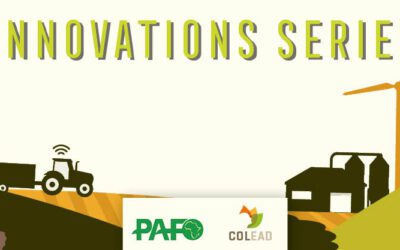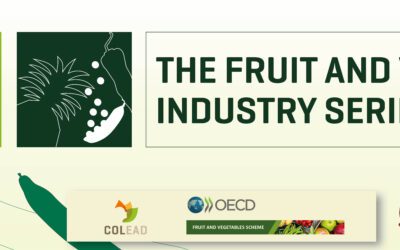Climate-Resilient Business Models for Women Entrepreneurs
Innovations Session N°21
Program Links
Session Highlights
No highlights available.
October 10, 2024
Population growth and urbanization are changing food production trends and transforming people’s dietary habits. In the rapidly evolving market landscape of Africa, farmers and small and medium-sized enterprises (SMEs) face unique challenges and opportunities to meet the changing needs and preferences of consumers. A more sustainable and equitable food system is needed, and it can be built on stronger relationships between people, communities and their environments. Short food supply chains have gained increased attention in recent years due to their potential for creating beneficial economic, social and environmental outcomes. Creating connections between consumers and producers seems a promising approach to foster sustainable consumption behaviour in international food supply.
Traditional food deliveries based on direct supplies or sales in physical marketplaces (farmers’ markets) were the forerunner of today’s short food supply chains. Recent developments in the food market show a renaissance of traditional, direct ways of delivering food, coupled with an emergence of more innovative types of distribution systems which provide direct linkages between producers and end consumers.
A significant change to food systems and to consumption habits is needed. Consumer organizations are part of the solution and must be included as fundamental partners for driving this change. With the right information, knowledge and incentives, consumer behaviour can impact positively upon the achievement of the right to adequate food for all. Raising the awareness of consumers, in the right context, can empower them to make choices that will aid a transformation of food systems, generating social, economic, cultural and environmental good practice, to influence policy and legislation that will drive a sustainable course. Consumer behaviour not only responds to, but also contributes to the way food is produced, processed, distributed, marketed, consumed and wasted; as such, responsible consumption, combined with responsible private sector action, greater governance, and political and fiscal incentives, can carve the way for sustainable, ethical and fairer development.
Many consumer organizations around the world already provide consumer education on the role consumers can have in combatting and mitigating climate change. Their campaigns show, for example, how consumers can reduce their carbon footprint, reduce plastics consumption, food and water waste, buy locally and organic, recycle and compost, generate their own urban or rural small holdings, and ‘go green’. A consumer who knows more about the origins and the processes involved in the production of food could make responsible food choices, especially if additional incentives exist, such as on pricing or subsidies.
The expectations of consumers from farmers and value chain actors in the agrifood sector are multifaceted and ever evolving. Quality and safety, sustainability, ethical practices, innovation, and health are some of the key areas where consumers have set high standards. Meeting these expectations requires a concerted effort from all stakeholders in the agrifood value chain. By embracing sustainable practices, leveraging technology, and prioritizing ethical and health considerations, farmers and value chain actors can not only meet but exceed consumer expectations, paving the way for a more sustainable and resilient agrifood sector.
African farmers and SMEs are responding to the changing needs and preferences of consumers through a combination of technology adoption, sustainable practices, product innovation, strong consumer relationships, and adaptability.
Session Region
Networking
Join our Forum to discuss and explore how to encourage innovations across agricultural value chains to transform food systems in African, Caribbean and Pacific countries and beyond, promote sustainable agriculture & leverage investments. Share insights, ask questions, and collaborate on innovative solutions for a greener future.

Isolina Boto
Head of Networks and Alliances, COLEAD
Isolina Boto is the Head of Networks and Alliances at COLEAD. She has more than 25 years of experience in...

Dr. Babafemi Oyewole
CEO, PAFO
Dr. Babafemi Oyewole is the CEO of the PAFO. He was a Chevening Scholar for his PhD in development economics...

Marlène Kindji
Founder and Director, Badémè Natural Foods
Marlene Kindji has over seven years’ experience in food processing and has a master’s degree in finance and treasury administration.

Joanne Murunga
COO, Kentaste
Joanne Murunga is a sales professional and passionate about consulting, service, food and culture.

Peter Mwangi
Founder And Ceo, Pemu Agrifood Academy, Farmworks Agriculture
Peter Mwangi is a visionary agribusiness leader with over 25 years of experience in transforming agricultural practices and food systems...

Tantely Rakotabe
FOUNDER MANAGER, TROPIKALY & UTAM
Tantely Rakotabe is passionate about entrepreneurship, and is a Certified Professional Coach and Trainer.
Francis Mua
Regional Project Coordinator, Slow Food Kenya
Francia Muia is the Regional Project Coordinator of Slow Food Kenya.
Ousseini Ouedraogo
Executive Secretary, ROPPA
Ousseini Ouedraogo is an agricultural engineer, and the Executive Secretary of the Network of Farmers‘ and Producers’ Organisations of West...
English
Français
Português
Recent Sessions
Innovations Session N°25
Foresight: Key agrifood changes impacting entrepreneurs (South-South)
Fruit and Vegetable Industry Session N°11
Market dynamics in the F&V industry: The role of supermarkets and large retailers in shaping market trends and prices



